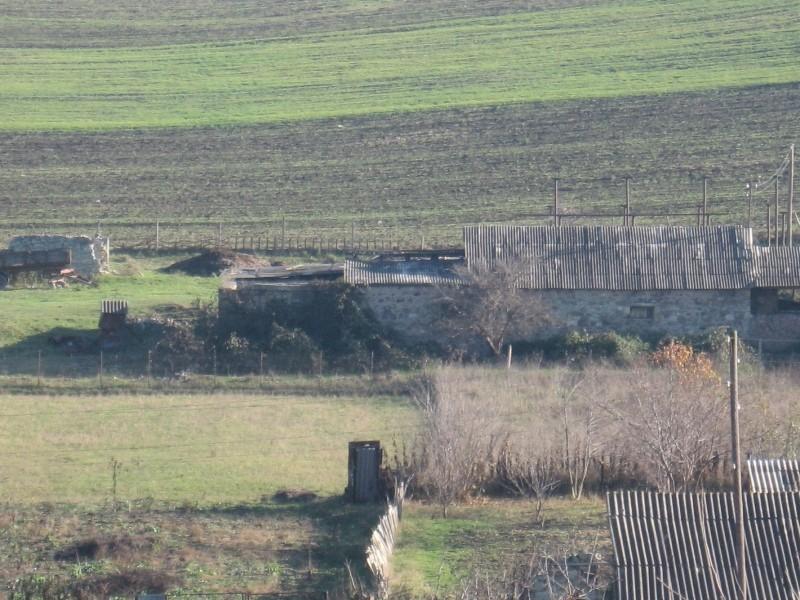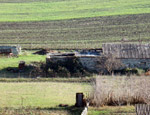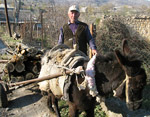
Cattle Theft Hits Tavush: All Tracks Lead to the Azeri Border
 As of 2007, residents of the border village of Nerkin Karmiraghbyur, Tavush Marz, have been living in fear and dread. The Azerbaijani villages of Albalu and Hajalu lie only 700 meters away. During the past two years, there have been eight incidents of cattle rustling registered and the villagers are at their wits end.
As of 2007, residents of the border village of Nerkin Karmiraghbyur, Tavush Marz, have been living in fear and dread. The Azerbaijani villages of Albalu and Hajalu lie only 700 meters away. During the past two years, there have been eight incidents of cattle rustling registered and the villagers are at their wits end.
While there is the possibility that the animals merely wandered over the border themselves, the Armenian villagers are fearful that the day will come when the Azeris will sneak across and kidnap people, not farm animals.  Aslan Adamyan told “Hetq” that seven sheep were stolen from his barn last year and the police never found those responsible. “In the span of one night my entire barn was emptied. The police said they’d conduct a search. What kind of search was it that they still haven’t turned up any clues or any leads?” asks grandpa Aslan. The old man is convinced that the animals disappeared over the border. “Don’t ask me who’s carrying the animals away but the tracks lead to the border and then disappear.” Nerkin Karmiraghbyur: Where did the animals go? Another theft of animals took place in Nerkin Karmiraghbyur on November 21. Eighteen head of cows belonging to Nerses Adamyan were taken at a value of 3 million AMD. “I’m the eighth villager whose barn has been raided in the past two years. The case files of the other seven thefts have been closed as unsolved. My case will probably end up the same. After the theft I went and spoke with Investigator Hunan on two occasions. He told me he was working on the case. I asked him straight out – fine, you’re working on my case but what happened to the other seven before me? The police tell us that the animals crossed the border and that they can’t do anything more. The soldiers tell us that even a little birdie hasn’t made it over the border and that we shouldn’t raise the matter at all,” Nerses told us. He recounted that there were 23 cows and one calf in the barn. Sometime during the night of November 21, the 23 cows were let out and driven through the fields. On the way, five escaped their captors and were found wandering the next morning. “The tracks of the 18 cows lead to the border with Azerbaijan, in the direction of Aygepar village. We can’t get close to the border because the Azeris are always taking pot shots. Now, I can’t tell you if the cows crossed over or simply flew away. All I know is that the tracks lead to the border. We’ve been lifelong neighbors with the Azerbaijanis and there’s never been an incident when they have snuck over and robbed us. Maybe it was some Armenians, maybe some Azeris. All I know is that it all started around two years ago. But even if it’s the Azeris coming over, they have to have some accomplices on this side,” Nerses said. “The police patrol but thefts continue under their nose”
Aslan Adamyan told “Hetq” that seven sheep were stolen from his barn last year and the police never found those responsible. “In the span of one night my entire barn was emptied. The police said they’d conduct a search. What kind of search was it that they still haven’t turned up any clues or any leads?” asks grandpa Aslan. The old man is convinced that the animals disappeared over the border. “Don’t ask me who’s carrying the animals away but the tracks lead to the border and then disappear.” Nerkin Karmiraghbyur: Where did the animals go? Another theft of animals took place in Nerkin Karmiraghbyur on November 21. Eighteen head of cows belonging to Nerses Adamyan were taken at a value of 3 million AMD. “I’m the eighth villager whose barn has been raided in the past two years. The case files of the other seven thefts have been closed as unsolved. My case will probably end up the same. After the theft I went and spoke with Investigator Hunan on two occasions. He told me he was working on the case. I asked him straight out – fine, you’re working on my case but what happened to the other seven before me? The police tell us that the animals crossed the border and that they can’t do anything more. The soldiers tell us that even a little birdie hasn’t made it over the border and that we shouldn’t raise the matter at all,” Nerses told us. He recounted that there were 23 cows and one calf in the barn. Sometime during the night of November 21, the 23 cows were let out and driven through the fields. On the way, five escaped their captors and were found wandering the next morning. “The tracks of the 18 cows lead to the border with Azerbaijan, in the direction of Aygepar village. We can’t get close to the border because the Azeris are always taking pot shots. Now, I can’t tell you if the cows crossed over or simply flew away. All I know is that the tracks lead to the border. We’ve been lifelong neighbors with the Azerbaijanis and there’s never been an incident when they have snuck over and robbed us. Maybe it was some Armenians, maybe some Azeris. All I know is that it all started around two years ago. But even if it’s the Azeris coming over, they have to have some accomplices on this side,” Nerses said. “The police patrol but thefts continue under their nose”  Nerses Adamyan also told us that the cops started patrols after the first theft was reported in the village; but to no avail. The thefts continued. “I leave the house every night just to check if the police are making their rounds. They tell me not to worry; that they’re on the job. I can’t be spending all my days and nights on the lookout, but I can’t stand not knowing what’s going on. My anxiety gets the better of me and I still make my nightly rounds. The cops told me to leave the outside light on at night. On the night of the theft I went out to the barn at around 3 a.m. I thought I heard some cows mooing, so I moved closer to the barn. I looked like there was a light shining from inside. The police were parked a little ways away in their car. When they saw me approach, they immediately turned the headlights of the patrol car onto the barn. I saw them get out and look me over. I was reassured and went back inside. I thought to myself then that they wanted to show that they were on top of things and that I could return home safe in the knowledge that all was OK. The next morning, the first thing I did was check the barn. There wasn’t a cow in sight. I now realize that I actually did see a light in the barn that night and that something was fishy,” Nerses recounted. I asked Nerses what he made of the fact that his 18 cows were seemingly stolen under the noses of the police. “Hey, it wasn’t me or you. That night the cops were right near my barn. They knew that I was the only one left in the village with animals, all the others having been already stolen. The cops later kept asking me if I thought the cows had crossed the border or not. Yeah, I said. It’s possible. Fine, said the cops. The animals’ owner says they crossed over - case closed. But then the soldiers came and told me to say that the animals didn’t cross the border. Fine, I said. But if they didn’t make it to the other side where the heck did they go? The animals have been disappearing from this village for the past two years. It’s high time that an expert investigator is called in to make some sense of it all. The cops blame the border guards and the guards turn around and blame the cops,” Nerses says, with more than a hint of annoyance. Police blame border guards and vice-versa Nerses goes on to say that “a man from the ministry” recently visited the village. (It seems the official never mentioned just what ministry). Nerses was called down to explain what happened the night his 18 cows disappeared. Nerses says that he showed up to give his side of the story but that he almost got into a fight with the local army colonel and that the others had to separate the two of them. “The colonel told me that my cows couldn’t have possibly crossed the border because the area had been mined. He told me that if I persisted in claiming that the cows had crossed over, I should try to do the same. ‘Go cross. Let’s just see if you make it.’ They’re not really doing a professional job at getting to the bottom of the matter. All they want to do is come up with a way to wash their hands of the entire mess,” Nerses asserts. Mayor Manvel Kamendatyan of Nerkin Karmiraghbyur confessed to “Hetq” that he couldn’t say for certain whether the animals were ferried over the border or not. “I can’t say either way since I didn’t see it with my own eyes. That’s something only known at the top echelons. They came and conducted their studies. We’ve informed the appropriate bodies not just once but ever since 2007,” stated Mayor Kamendatyan. We asked him if the tense atmosphere prevailing in the village didn’t concern him. “It concerns me first and foremost. That’s why we wrote to the government and they sent some people here,” he answered. Armen Malkhasyan, who works at the Police Department’s Division of Public Affairs, reported that there have been fifteen cases of animal theft in Tavush Marz this year alone and that eleven have been solved. Mr. Malkhasyan claimed that the police were conducting surveillance patrols in all the villages. But he had nothing definite to say regarding the eight unsolved cases of animal theft in Nerkin Karmiraghbyur during the past two years. All he did say was that he wasn’t allowed to tell us the theories the police held to. “Let me repeat. Eleven out of the fifteen cases this year have been solved. I leave you to draw your own conclusions,” Mr. Malkhasyan replied.
Nerses Adamyan also told us that the cops started patrols after the first theft was reported in the village; but to no avail. The thefts continued. “I leave the house every night just to check if the police are making their rounds. They tell me not to worry; that they’re on the job. I can’t be spending all my days and nights on the lookout, but I can’t stand not knowing what’s going on. My anxiety gets the better of me and I still make my nightly rounds. The cops told me to leave the outside light on at night. On the night of the theft I went out to the barn at around 3 a.m. I thought I heard some cows mooing, so I moved closer to the barn. I looked like there was a light shining from inside. The police were parked a little ways away in their car. When they saw me approach, they immediately turned the headlights of the patrol car onto the barn. I saw them get out and look me over. I was reassured and went back inside. I thought to myself then that they wanted to show that they were on top of things and that I could return home safe in the knowledge that all was OK. The next morning, the first thing I did was check the barn. There wasn’t a cow in sight. I now realize that I actually did see a light in the barn that night and that something was fishy,” Nerses recounted. I asked Nerses what he made of the fact that his 18 cows were seemingly stolen under the noses of the police. “Hey, it wasn’t me or you. That night the cops were right near my barn. They knew that I was the only one left in the village with animals, all the others having been already stolen. The cops later kept asking me if I thought the cows had crossed the border or not. Yeah, I said. It’s possible. Fine, said the cops. The animals’ owner says they crossed over - case closed. But then the soldiers came and told me to say that the animals didn’t cross the border. Fine, I said. But if they didn’t make it to the other side where the heck did they go? The animals have been disappearing from this village for the past two years. It’s high time that an expert investigator is called in to make some sense of it all. The cops blame the border guards and the guards turn around and blame the cops,” Nerses says, with more than a hint of annoyance. Police blame border guards and vice-versa Nerses goes on to say that “a man from the ministry” recently visited the village. (It seems the official never mentioned just what ministry). Nerses was called down to explain what happened the night his 18 cows disappeared. Nerses says that he showed up to give his side of the story but that he almost got into a fight with the local army colonel and that the others had to separate the two of them. “The colonel told me that my cows couldn’t have possibly crossed the border because the area had been mined. He told me that if I persisted in claiming that the cows had crossed over, I should try to do the same. ‘Go cross. Let’s just see if you make it.’ They’re not really doing a professional job at getting to the bottom of the matter. All they want to do is come up with a way to wash their hands of the entire mess,” Nerses asserts. Mayor Manvel Kamendatyan of Nerkin Karmiraghbyur confessed to “Hetq” that he couldn’t say for certain whether the animals were ferried over the border or not. “I can’t say either way since I didn’t see it with my own eyes. That’s something only known at the top echelons. They came and conducted their studies. We’ve informed the appropriate bodies not just once but ever since 2007,” stated Mayor Kamendatyan. We asked him if the tense atmosphere prevailing in the village didn’t concern him. “It concerns me first and foremost. That’s why we wrote to the government and they sent some people here,” he answered. Armen Malkhasyan, who works at the Police Department’s Division of Public Affairs, reported that there have been fifteen cases of animal theft in Tavush Marz this year alone and that eleven have been solved. Mr. Malkhasyan claimed that the police were conducting surveillance patrols in all the villages. But he had nothing definite to say regarding the eight unsolved cases of animal theft in Nerkin Karmiraghbyur during the past two years. All he did say was that he wasn’t allowed to tell us the theories the police held to. “Let me repeat. Eleven out of the fifteen cases this year have been solved. I leave you to draw your own conclusions,” Mr. Malkhasyan replied.
 Videos
Videos Photos
Photos
Write a comment